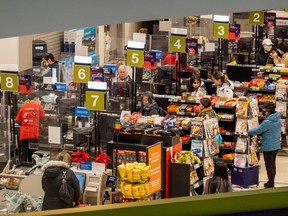
I would like to clear up an urban myth.
Who hasn’t been asked at the cash register: “Would you like to add a donation to (fill in the charity) today?”
As the Canadian national soccer teams head to their respective FIFA World Cups, Derek Van Diest is on the scene to cover all the action. Expect expert insights and analysis in your inbox daily throughout the tournaments, and weekly on Thursdays for the rest of the season.
Thanks for signing up!
A welcome email is on its way. If you don't see it, please check your junk folder.
The next issue of Corner Kicks with Derek Van Diest will soon be in your inbox.
Some people obviously say yes, especially during the season of giving.
Perhaps you feel a little social pressure when that happens. The nice lady behind you in line hears the question and the answer. The nice young man asking the question may or may not care whether you donate.
But it is a bit of pressure – it is easy to throw in a couple of bucks – except for the fact that you will be asked again at the next place you shop and likely the one after that.
In the end it is up to you based on your ability and your willingness. It is no one else’s business.
You may have heard the warning not to donate at the cash register. The myth is that the big corporations – Walmart, Loblaw, etc. – collect millions of dollars a few bucks at a time from shoppers, then make huge donations to charity as the company, taking the tax deduction on the total themselves.
RECOMMENDED VIDEO
The assertion is that such a practice results in the corporation not paying the tax they should and that hurts government’s collection of tax and charity collecting in general.
There are several problems with this warning but the main one is that it just isn’t true.
Maclean’s magazine wrote, “Retailers aren’t legally allowed to claim a deduction for donations of cash that doesn’t belong to them, even if they did collect it.”
Thinking that maybe this belief started with someone conflating American tax law with Canadian I checked that as well.
USA Today reported, “Donations made by customers at checkout are not tax-deductible for the business, as the donation does not come from the company. According to The Tax Policy Center, the business only serves as a collector for charitable donations from its customers and has no right to claim any of the collected funds.”
It is also wrong that the collection of donations at the cash register lowers tax revenue. The opposite is true.
Since the company doesn’t claim the deduction, it is available for the person who donated the money. But it is estimated that, even if shoppers collect the receipt, only one of 10 actually bothers to make the claim on their taxes.
It is actually a net gain for the government, unless of course many people only make small donations but claim the general deduction for charity. Check with your accountant, I am not one.
Many people say that it is best to donate directly to the charity and that is fine, especially if you are going to make a donation larger than two to five dollars like you might make at the cash register.
Certainly, that’s an attraction for charities to sign up with corporations for cash-register donations. They add up.
Why do corporations do it?
It makes them look good. They helped out. They get to advertise what great corporate citizens they are.
Whether you donate or not — and some people do to help others — that’s all we need to worry about.


